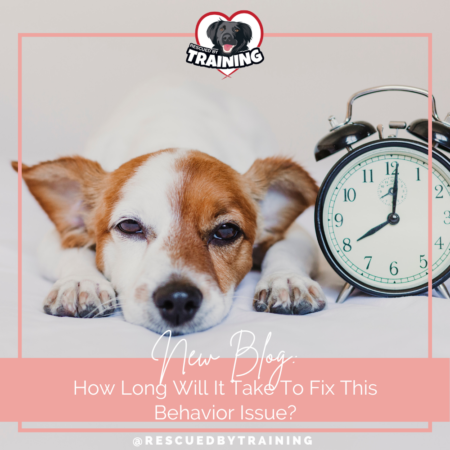Clients almost always ask “how long will this take to fix?” and I can never give them a concrete answer. I don’t have a crystal ball or a magic wand. I’m not hiding anything, in fact, I’m being completely transparent, unlike unqualified trainers who often offer guarantees of behavior results. Behavior, in any animal, isn’t something that can be guaranteed. In fact, many ethical organizations like the Pet Professional Guild and IAABC have Code of Ethics guidelines preventing members from offering any sort of guarantee on results because behavior is influenced by too many factors out of our control, as stated by PPG, “due to the nature of applied animal behavior and limiting factors around the pet guardian such as time commitment, family circumstances, management practices and other environmental factors.”
Even though all dogs learn the same ways (learning isn’t breed specific – there’s never a need for using a “heavy hand” on some breeds!), each dog is individual and there’s a lot of factors that go into how quickly a behavior problem will improve or resolve.
Dogs are living, breathing individuals, not computers we just program and then that’s it.
And let’s be honest, even your computer doesn’t always do what you’d like it to do!
This is why unscrupulous trainers who offer guarantees and promises to “fix” behavior in a few short weeks is so deceptive and unethical. Almost always the methods they’re using – predominantly shock, pain, fear, intimidation and the like – are ineffective, inhumane and outdated. And all these do are suppress outward symptoms. They don’t actually result in long term behavior modification. Behavior suppression is not behavior modification.
Learning and behavior change is a lifetime commitment and process.
It’s hard for clients to understand when we have TV entertainers that seemingly resolve complex behavior issues in a 30 minute show and profess that the ultimate goal is to have a “calm” dog. Dogs being shut down or scared because of aversive training methods or tools and then that being passed off as a “calm, relaxed state” is criminal, as far as I’m concerned. You can read my Myth of the Calm Dog for more on this.
So how long will behavior change take? Well, it depends. It depends on a lot of factors including:
- Client’s availability and commitment to training, including time, money and other resources to help the dog
- The dog’s issue. Some behavior challenges are easier than others to improve. And the more issues the dog has, the longer things will take.
- Duration. Behaviors that have been rehearsed or reinforced for a longer time will often take longer to change.
- Previous training history and the dog’s personal learning curve. Just like with people, some learn more quickly than others.
- Previous training methods used and the dog’s communication/body language. The use of aversives (like shock collars or yelling at the dog) can cause a reduction in dog communication, which can increase the difficulty of resolving issues.
- The client’s ability to implement management during training. Examples of this might be suspending all absences for sep anx dogs or not having company over for stranger danger dogs.
- Behavior medication. Meds can be incredibly helpful in complex behavior cases but if the client hasn’t started down the meds path, that can delay progress. Even if a dog has started meds, often as training progresses we need to check back with the vet for an adjustment or reassessment.
- Regressions. Regressions are normal. Nobody learns completely linearly. When you’re learning a new sport, skill or musical instrument, very few of us are natural proteges. The rest of us learn with incremental progress, breaking learning objectives into achievable smaller goals, making mistakes along the way and improving as we learn.
- Moving at the dog’s pace. Always moving at the dog’s pace. Dogs who are constantly pushed, often over their safety threshold, just don’t do as well as dogs who get rest days and who get some easy wins. Nobody should have to work at 100% capacity, 100% of the time.
Hopefully this helps you understand why setting a timeline on your dog’s behavior journey just isn’t possible and would be unethical. I cannot make promises about your dog’s behavior, anymore than a surgeon can guarantee results from a complicated surgery. What I can guarantee is that I will always be transparent with you about expectations, realities, progress and prognosis.. Recovery from separation anxiety or other serious behavior issues is possible and I can help you and your dog’s quality of life, strengthening your relationship and bringing relief to both of you. But it takes time. Let’s work on this journey together. Don’t you both deserve that?
If you think your dog might have separation anxiety or are looking for some guidance on separation anxiety training, check out my self-paced, affordable course, Separation Anxiety Training Foundations (SATF) course. Or reach out today and schedule your assessment.
For other behavior concerns, you can grab a one on one appointment with me here.
Happy training!
![]()




